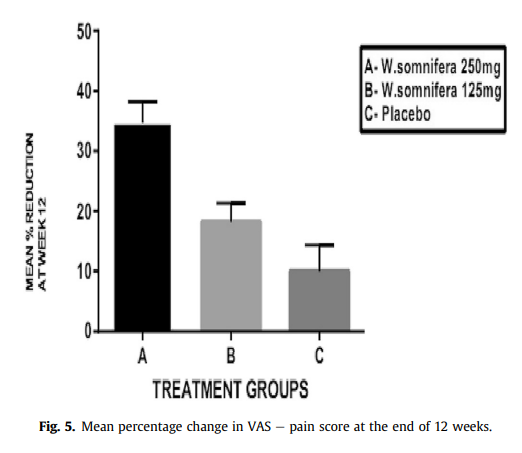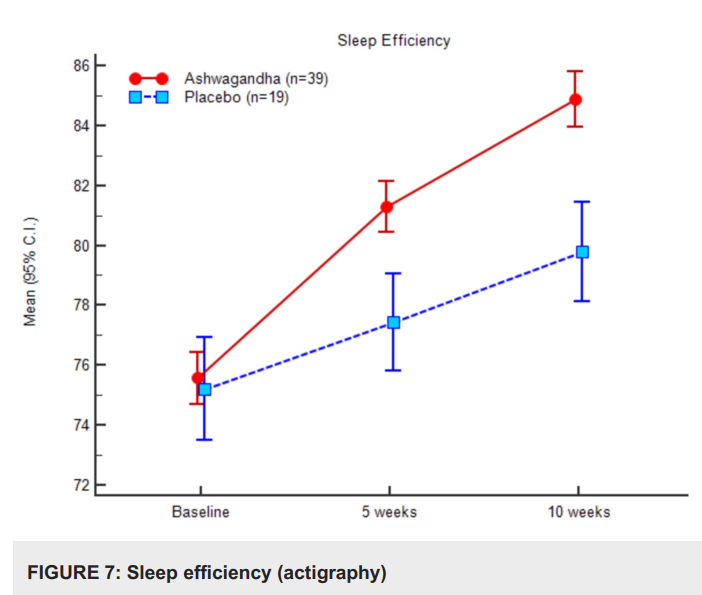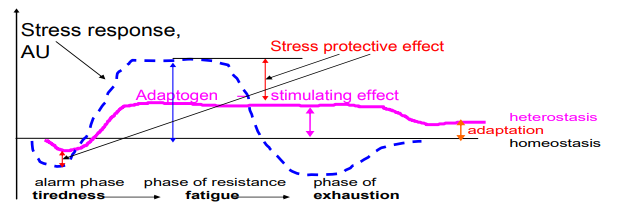Ashwagandha is becoming increasingly popular among athletes. And for good reason: many positive properties are attributed to the product:

Claims regarding alleged positive effects of Ashwagandha
But which of these statements are actually true? We have examined the individual claims more closely.
What are the Properties of Ashwagandha?
Before we take a closer look at the actual effects of Ashwagandha, it is useful to discuss its biochemical properties beforehand. In other words: What exactly makes Ashwagandha so special?
Antioxidant
Experimental studies have shown that Ashwagandha contains a degradation product of the antioxidant substance glutathione: CR-777. This has demonstrated neuroprotective properties against stressors (1). The antioxidant effects – measured by glutathione concentration – could also be demonstrated in RCT studies with humans (2).
Anti-inflammatory
Ashwagandha has anti-inflammatory effects via several signaling pathways: On the one hand, fewer inflammatory cytokines, such as IL-1, IL-6, and TNF, are released (3). On the other hand, the plant extract appears to positively influence certain immune proteins (killer cell activity, pre-albumin alpha2 glycoprotein), which in turn can have a positive effect on inflammatory diseases (4, 5, 6).
Stress-relieving
Ashwagandha is said to belong to a group of plant extracts with adaptogenic properties. This means they exhibit a stress-relieving effect. In other words: When exposed to the same stressor, the physiological response to cope with stress is expected to be reduced.
This hypothesis is supported, on the one hand, by increased GABA activity after Ashwagandha intake (7). GABA is one of the most important neurotransmitters for “calming” the central nervous system. Furthermore, two studies observed a reduced release of the stress hormone cortisol after intake: Cortisol concentration was approximately 25% lower after Ashwagandha intake in each case (8, 9).
Pain-relieving
A pain-relieving effect was investigated, among other things, in connection with chronic arthritis (cartilage damage): After 12 weeks of taking 250mg of Ashwagandha, not only a significantly positive effect on pain perception was observed, but also a reduction in knee joint swelling (10).

Change in subjective pain perception after 2 weeks of Ashwagandha intake (x)
Also interesting in this context is a study on rats that suffered from severe neuropathic pain and underwent surgery. Here, the intake of Ashwagandha concentrate led to a significant improvement in the motor function impaired by pain. The “screams/squeaks” caused by the pain also noticeably decreased (10).
Three different dosages were tested in rats: 30 mg/kg vs. 100 mg/kg vs. 300 mg/kg. At higher dosages, a stronger increase in anti-inflammatory cytokines was measured. However, there were no differences between the individual dosages in the mechanical compensation of pain. The lowest dosage of 30mg/kg therefore seems sufficient to induce a pain-relieving effect. To what extent this dosage can be transferred to humans is currently unclear. Because: If one were to convert the dosage used in the rat study to the weight of an 80kg human (30mg x 80kg), one would arrive at the very high dose of 2400mg/day. For comparison: In most human studies, 300-600mg per day are administered.
Another interesting finding of the aforementioned study is that a positive effect of Ashwagandha on the pain receptor CCR2 could be observed, thus identifying a possible reason for the observed pain-relieving properties.
Cancer
There are some mechanistic studies that have identified potentially positive effects of Ashwagandha on cancer. However, high-quality human studies are lacking, which is why the following information should be evaluated with great caution.
In cell cultures, improved activity of relevant immune cells was observed, and at the same time, inflammatory parameters, which are usually negatively affected by cancer cells, were improved (11).
In isolated breast cancer cells, a reduced cell death rate in mitochondria was observed when exposed to proteins extracted from Ashwagandha (12).
Dementia
Already in the late 1990s, potentially neuroprotective properties of Ashwagandha were observed. For example, in isolated cell cultures, it was observed that Ashwagandha improves lipid peroxidation (LPO); simplified, this refers to inflammatory processes in neurons. Additionally, increased concentrations of the antioxidant enzymes CAT and GPx were measured in the brains of rats (13). Improved regeneration of damaged synapses was also observed (14).
Cognitive impairments induced by drug administration in rats were attenuated by Ashwagandha intake (15). Furthermore, the formation of β-amyloid peptides was reversed in mice (16). This is a protein structure that, as a precursor of a glycoprotein, can penetrate the brain’s cell membrane and promote plaque formation – and thus Alzheimer’s – there (17).
The artificially induced elevation of neurotoxins associated with Parkinson’s was improved by Ashwagandha intake in rats. Motor skills also showed improvement after taking an Ashwagandha concentrate (18).
Sleep
The effects of Ashwagandha on sleep quality are now relatively well-researched. In some studies, sleep quality was assessed using a subjective scale, while in others, it was evaluated via actigraphy (a wrist-worn device). Both methods have good validity compared to the gold standard – polysomnography (19, 20).
In a meta-analysis with 400 subjects, a positive effect on the improvement of sleep quality was measured in all relevant studies (21).

Example of improved sleep quality after Ashwagandha intake – measured with actigraphy (19)
The positive effects on sleep quality are highly likely due to the influence of the neurotransmitter GABA. This has an inhibitory effect on the central nervous system and is associated with improved sleep quality (22).
There is an interesting animal study in which mice were first “artificially” brought into an awake state through caffeine intake, to then observe to what extent Ashwagandha intake positively affects sleep.
In this study, researchers observed increased GABA activity after Ashwagandha intake, suggesting a “calming” effect on the central nervous system. Additionally, Ashwagandha also appears to positively affect serotonin receptors, which is also associated with better sleep. This had a positive impact on deep sleep and sleep duration (23).
However, the following finding from a human study is more important: Ashwagandha positively affects sleep quality in both healthy individuals and those suffering from chronic sleep problems (24).
Stress Reduction
Many studies have investigated the extent to which Ashwagandha intake positively affects the well-being of individuals with high chronic stress levels and anxiety. In the vast majority of studies, a positive effect on stress levels and anxiety was observed (25, 26, 27). However, an interaction between the positive effects on sleep quality and the resulting stress reduction is also possible here (28).

Reduced stress perception, measured via PSS (23)
Performance Effects
Endurance
In mice, an increased concentration of red blood cells was detected after Ashwagandha intake (29). In theory, at least, this can lead to improved oxygen transport and, consequently, endurance performance. While there are also some studies on healthy humans that have investigated potential effects on endurance performance, unfortunately, almost all of these exhibit methodological shortcomings and are of low quality.
For example, Tiwari and colleagues (2021) observed improved endurance capacity – measured by changes in VO2max values (30). Choudhary et al. (2015) also observed improved endurance capacity after 8 weeks of Ashwagandha supplementation (31). However, the VO2max value in the study was not measured during a standard test with increasing intensity on an ergometer, but during a 20m shuttle run. Here too, it is therefore questionable how conclusive the results are.
There is also a study on well-trained cyclists in which a positive effect on VO2max values and “time-to-exhaustion” on an ergometer was observed after 8 weeks of Ashwagandha intake (500mg/day) (32). However, the study lacks many important details regarding training, performance testing, and nutrition, which makes a comprehensive evaluation of the study difficult.
In a higher-quality study, however, no effect of 500mg Ashwagandha per day on a 7.5km time-trial performance on a cycle ergometer was observed (33).
Strength
To our knowledge, there are only 2 studies that have investigated possible effects on strength performance:
In one of the better studies in this area, a slightly positive effect on 1-RM strength performance in bench press and squat was observed after 12 weeks of daily Ashwagandha intake (500mg) (34).

Change in 1-RM squat after 12 weeks of Ashwagandha intake (34)
The second study is similar in design, and here too, a slightly positive effect on 1-RM strength performance in bench press was observed (35). Additionally, a slight increase in testosterone levels and improved muscle building in the arms were observed. However, no change was observed in chest circumference and leg circumference.
Compared to studies in the endurance field, intervention studies in the strength field are of significantly higher quality. However, it should be kept in mind that the subjects were not advanced athletes, and it is therefore unclear how Ashwagandha affects better-trained athletes.
Recovery
Improved recovery is among the most frequently mentioned benefits for athletes. Naturally, it is plausible that the aforementioned benefits in sleep quality and the reduction of the stress hormone cortisol also positively affect the recovery of the central nervous system in athletes. However, we do not know this without corresponding investigations. Furthermore, there are surprisingly few studies that address potential effects on recovery.
In combination with strength training, Ashwagandha intake led to slightly improved CK values, which is sometimes used as a biomarker for muscle damage (36). However, it is unclear whether muscle soreness was actually reduced by the intake.
In a study with healthy young men, an improvement in subjective recovery in connection with endurance sports was observed. Additionally, an improvement in markers for oxidative stress was observed (37). This sounds very promising at first, but unfortunately, important information regarding training and nutrition is missing here to truly evaluate the intervention in detail.
Side Effects
Besides all the hype about the potential benefits of Ashwagandha, one should also always inform themselves about health risks.
Nausea, abdominal pain, or diarrhea are among the documented side effects (38). However, these rarely occur at typical dosages of 300-600mg and are not too severe (39).
However, there are also isolated documentations of liver failure (40, 41). If Ashwagandha were truly to increase the risk of liver failure, that would, of course, be a very high health risk. Unfortunately, the exact dosage of Ashwagandha is not mentioned in the reports, and patients sometimes also take other dietary supplements, which makes an accurate risk assessment difficult. It also cannot be ruled out that the liver problems were caused by other factors and that the patients coincidentally also took Ashwagandha. At least so far, controlled placebo studies have not found any negative effects on organ health (42).
We do not want to downplay the risks. Monitoring liver values is definitely recommended, and intake is strongly advised against in cases of pre-existing liver problems. Because the risk of potential side effects is currently not entirely clear, intake is advised against during pregnancy and for breastfeeding mothers (43).
Conclusion and Evaluation
- Ashwagandha indeed exhibits several health-promoting properties: Here, the stress-relieving effect and positive influence on sleep quality are particularly noteworthy.
- It may also have a positive effect on dementia, although high-quality human studies confirming previous observations in mice are lacking.
- There are some indications that Ashwagandha could positively affect endurance performance, but more high-quality studies are needed to conclusively evaluate this effect.
- The same can be said for possible benefits in strength sports: Two studies are simply not enough to properly assess the effect.
- While it is generally possible that athletes would benefit from the stress-reducing effect, a direct correlation has not yet been investigated.
- Ashwagandha is suspected of negatively affecting liver health. However, this assumption is based on documented individual cases. Unfortunately, larger-scale studies investigating the safety of Ashwagandha currently do not exist.



